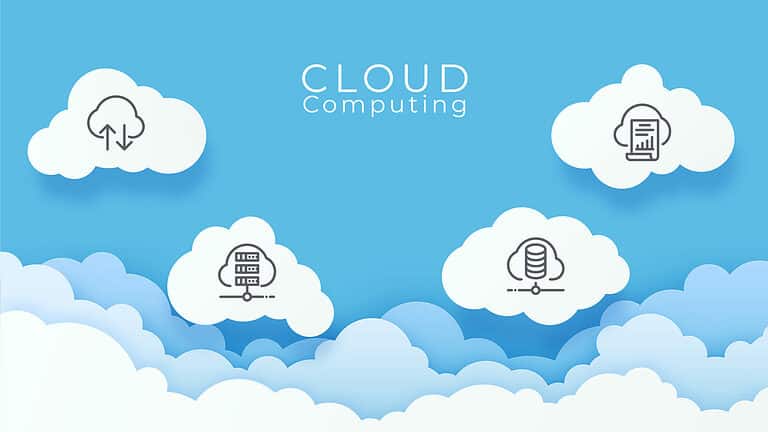Essential Cloud Roles and Responsibilities in Today’s Tech Landscape
Who makes the cloud work? Understanding the key cloud roles and responsibilities is fundamental for anyone in or entering the tech industry. This guide walks you through the essential positions within cloud computing, from engineers to strategists, and uncovers what each contributes to the digital cloud that supports modern businesses.
Key Takeaways
Cloud computing roles are structured in a hierarchical fashion, starting from entry-level cloud practitioners to senior strategists, each responsible for different layers of cloud operations and strategy development.
Core responsibilities that span across cloud computing includes designing, deploying, maintaining, optimizing cloud systems, and ensuring their security and compliance, which are fundamental no matter the specific role within the industry.
The evolution of cloud computing has led to a transformation from physical servers to serverless architectures and the introduction of specialized cloud platforms, altering the landscape of IT services and cloud professionals’ approach to infrastructure management.
Decoding the Cloud Computing Hierarchy

The cloud computing industry is made up of various professionals who all have a role to play in the overall execution of cloud operations. From entry-level practitioners laying the groundwork, to mid-level technicians adding complexity and senior strategists driving success, it’s easy to see how each role holds an important place within this intricate environment.
Let’s look closer at these roles so that we can gain greater insight into their specific contributions towards achieving maximum efficiency with cloud computing activities.
Entry-Level Cloud Practitioners
Cloud developers, or entry-level cloud practitioners, are essential in striking the first note of every melody for the orchestra that is cloud computing. They must obtain a firm understanding and hands-on experience with programming languages, databases, and various platforms associated with this technology to form a basis for creating reliable applications on it. Cloud professionals can Build upon these foundations set by such individuals. Hence they have an integral role within the realm of cloud computing as well.
Mid-Level Cloud Technicians
Cloud engineers and developers at the mid-level have a vital role in cloud computing. They are responsible for managing complex tasks such as overseeing the infrastructure of clouds, enhancing performance with close collaboration between them and providers, all while striving to reach their full potential. The entry level practitioners can also contribute by adding to its melody. Together these professionals make up an ensemble whereby both types of experts must work together using their respective skills in order to create this symphony we call cloud computing.
Senior Cloud Strategists
Reaching the apex of cloud computing, senior strategists take up their conductor’s baton. These experts or Cloud Consultants maintain perfect pitch by forming and carrying out comprehensive plans for companies as well as ensuring a smooth flow between parts to ensure an effective execution overall.
Core Responsibilities Across Cloud Computing Roles

Cloud professionals have unique roles in the cloud computing industry, yet share many responsibilities. These include designing and deploying cloud systems, keeping them maintained and optimized, as well as ensuring they adhere to security standards. All of these core duties are essential for those looking into a career in this field.
To skill sets that vary from role-to-role within the realm of cloud computing jobs, there is also common ground where shared tasks must be undertaken effectively by all involved parties. Regardless of whether it’s one professional or several experts working together towards success on a project scale with cutting edge applications—all of which pertain back to reliable technological investments made through secure operating system infrastructures built around sound engineering principles grounded upon solid theoretical foundations grounded through careful research milestones accomplished through leading industry advancements set forth over years of progress continuously fueled both domestically & globally alike shaping our current world markets so efficiently today.
Design and Deployment of Cloud Solutions
Cloud professionals such as architects and developers compose a cloud solution to the needs of their clients through designing and launching it. Just like composing music, these experts make sure each element of the cloud works in harmony with one another for an optimal result that runs smoothly. This forms the first note in what can be seen as a ‘cloud computing symphony’.
Maintenance and Optimization of Cloud Systems
Once the setup of cloud computing is complete, mid-level technicians like system engineers and administrators come into play to maintain a balanced output between cost and performance. Through fine adjustments in their respective departments, these workers guarantee a smooth functioning that won’t compromise on quality.
Ensuring Cloud Security and Compliance
Cloud security analysts are responsible for safeguarding the cloud infrastructure and keeping it secure and compliant with industry regulations. These diligent professionals keep a close eye on all operations taking place within this virtual symphony of cloud computing, making sure that best practices remain in check to ensure optimal safety of these networks.
Spotlight on Specific Cloud Roles

To delve into the essential parts of cloud computing, let us discuss the particular roles that bring it to fruition. Cloud architects, software engineers and database administrators form an integral part in this musical composition. It is their work together which makes up for a remarkable performance!
The Blueprint Creator: Cloud Architect
A cloud architect is the one who lays down the plans and creates a blueprint for setting up a successful cloud computing infrastructure. Their task involves designing, developing, integrating, optimizing and making sure that everything runs efficiently in this environment, just like how music composers do with their symphonies.
The Code Wizard: Cloud Software Engineer
The cloud developer is the next figure in line, acting as a code magician for all things related to cloud computing. This tech-savvy engineer develops and sustains software that works with clouds, ensuring everything runs harmoniously throughout its infrastructures. All of this expertise helps breathe life into architectural designs so they can be turned into fully functioning systems. As such, their role somewhat resembles that of music producers when it comes down to bringing about beautiful outcomes from initial blueprints – only here we’re talking about digital solutions instead!
The Data Steward: Cloud Database Administrator
In the cloud computing world, the role of a Cloud Database Administrator is similar to that of a sound engineer. They serve as data stewards in ensuring integrity and security for all data pieces while also making sure they remain accessible and functioning optimally for end-users. All together, these tasks are part of what enables them to keep this symphony orchestrated with excellence.
The Evolution of Cloud Services

The ongoing development of cloud computing has brought about remarkable advances, from the utilization of physical servers to serverless architecture. As specialized providers and platforms come into play, a diverse selection of tailor-made cloud services is accessible for different industries or purposes.
We will continue examining this journey through evolution in more detail. Key words like ‘cloud computing’, ‘cloud services’, ‘physical servers’, and ‘cloud platforms’ remain relevant as they were before, but with fresh expressions and an orderly flow that preserves their meaning while changing up the tone somewhat.
From Physical Servers to Serverless Computing
The evolution of cloud computing has experienced a noteworthy turning point through the transition from using physical servers to serverless computation. This transformation puts more emphasis on composition, and less attention is needed for managing IT resources, thus altering how organizations monitor and implement their technology solutions.
Specialized Cloud Platforms and Providers
Cloud computing has come a long way thanks to the development of specialized cloud platforms and provider services, which have enabled access to an ever-growing array of tailored solutions for various industries and applications. These developments have allowed the complex song that is cloud computing to be augmented with fresh rhythms in order for it’s reach far beyond what was once imaginable.
Navigating a Career in Cloud Computing

This guide will provide insight on how to build a successful career in cloud computing, from getting certified and gaining necessary skills through various courses up until working out strategies for Growth. We want those individuals who are passionate about being part of this fast-paced field by understanding all the roles, responsibilities and changes that come with it.
Whether you’re just beginning your journey or looking into ways to take things even further, we hope our advice helps you achieve success within the realm of cloud computing.
Acquiring Essential Cloud Skills
In order to be successful as a cloud computing professional, it is essential for them to gain specialized skills in the field. This encompasses understanding of programming languages, databases and relevant cloud platforms, including pertinent knowledge of security related aspects concerning the use of clouds. These are fundamental pieces that need perfecting if an individual wants their career aspirations within cloud computing to reach fruition.
Certifications That Boost Cloud Careers
Certifications from top cloud computing providers can be a great way to bolster your career prospects and demonstrate expertise in the field, which are both key components of an overall successful cloud computing journey. Achieving these certifications is similar to hitting all the right notes when you’re playing music, they will help create the perfect melody for success!
Strategies for Professional Growth
For professionals in the cloud computing industry, continuous learning and connecting with people along with tangible practice are fundamental components to achieving career development. Keeping up-to-date on emerging trends is imperative for ensuring success, making these three strategies key elements of any successful symphony of growth in this field.
Real-World Applications of Cloud Roles
The effects of cloud computing are far-reaching and make an impact beyond IT. This symphony has reverberated throughout a variety of industries, bringing about extensive changes in the way they operate. From healthcare to ecommerce, businesses have felt its presence all over the world.
Let’s investigate these real life examples further. We’ll see how this technology is being applied across many sectors such as telemedicine, retailing and electronic commerce where cloud computing makes itself known.
Impact on Healthcare and Telemedicine
Cloud computing has made a major impact on healthcare and telemedicine, allowing remote consultations to be carried out, data to be shared more effectively, and ultimately leading to better patient care. Through the use of cloud computing solutions as well as various other associated cloud technologies, we are able to see an improved harmony in global health services delivery.
Transformation in Retail and E-commerce
Cloud computing has drastically changed the retail and e-commerce sector, allowing businesses to expand, develop new ideas faster, and give customers tailored experiences. This invaluable technology’s influence on the industry is unparalleled, it serves as an essential tool in driving business growth while ensuring customer satisfaction levels stay high.
Summary
The complexities of cloud computing have become integral in the current digital age. With its multifaceted aspects and innovations, it has allowed a continuous shift to happen across different industries. It’s clear that this powerful technology will only continue to shape our future and anyone interested or involved with this field should understand what makes up its ever-evolving symphony, from roles played by professionals within the industry right down to small changes being made for improved performance.
Frequently Asked Questions
What are the responsibilities of cloud computing?
Cloud computing involves managing the entire process of creating and maintaining a cloud environment, such as developing applications for it, setting up its structure, securing resources accordingly and keeping all components updated.
What are the roles of cloud management?
Cloud management platforms are designed to improve the security and efficiency of cloud infrastructure, enable compliance with regulations, safeguard against cyber attacks/data breaches, and offer data-backed insights into application health. They provide automation for capacity optimization and orchestration processes which alleviates operational strain.
How has the transition from physical servers to serverless computing impacted the cloud computing industry?
Serverless computing has revolutionized IT resource management and deployment, allowing organizations to put more emphasis on their core business activities instead of infrastructure administration. This shift from physical servers brings a new way of controlling resources.
What are the benefits of obtaining certifications in cloud computing?
Achieving official recognition for cloud computing expertise can give one an edge in their job search and be a positive asset to any resume. Investing time and effort into obtaining certifications is sure to pay off professionally, providing numerous benefits that will bolster your employability prospects. Having this certification indicates a level of understanding.
How has cloud computing impacted the healthcare and telemedicine industries?
Cloud computing has revolutionized the way healthcare services are accessed and delivered. By allowing for remote consultations, data sharing capabilities, improved patient care outcomes, as well as increased efficiency in health operations, this technology is transforming how medical practices function.







